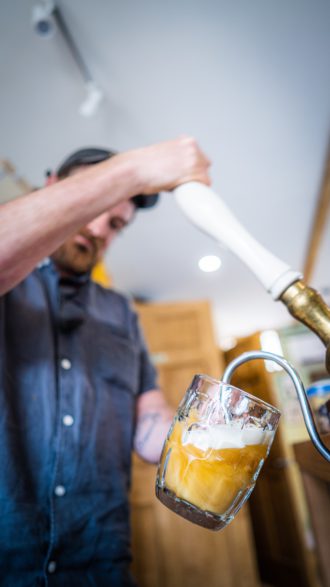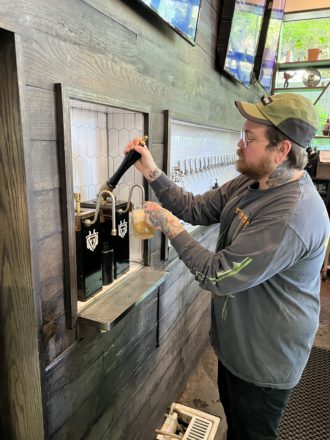For a certain set of craft beer consumers, there’s nothing like a proper cask ale. Pumped by hand from a beer engine, resulting in an intentionally tall, billowy head of foam, the beverages are typically easy drinking with low ABVs, yet give the tippler a distinct sensory experience.
“Cask conditioning lends a softer carbonation and often creamier mouthfeel,” says Chris Whaley, brewer and co-owner of Whaley Farm Brewery in Old Fort. “With the lessened impact of carbonic acid on the beer, flavors meld and often bring a more harmonious symphony of hop to malt and yeast-driven nuances.”
Oyster House Brewing Co. head brewer Philip Shepard says it’s his “favorite way to drink a beer.” And DSSOLVR head brewer and co-founder Vince Tursi considers English milds and bitters “perfected” styles that, if ignored by breweries, does “an injustice” to brewing history.
But if cask ales are so beloved, why do only a handful of Asheville-area breweries serve them?
“It’s a labor of love for old brewers, and it’s something that really doesn’t exist anymore — even in England,” says Mike Karnowski, brewer and co-owner of Zebulon Artisan Ales in Weaverville. “It’s us clinging to the golden age of beer when really it was about the beer and not about hype. And it was about drinking a lot of beer.”
He adds that throughout its history, beer was something that people imbibed significant amounts of while doing other fun activities. Now, instead of complementing pool or darts, beer “has become the fun,” which he feels puts undue pressure on the beverage to be the entertainment.
“Beers should be a simple, easily, drinkable thing that you can drink a lot of while having fun doing other things,” Karnowski says. “So, [cask ale] harkens to the day when beer was something that you didn’t pay too much attention to — but if you wanted to, you can still geek out on it. You can really dig in on the yeast character and minerality. But you can also just drink six pints while you’re throwing some darts, and there’s just not a lot of modern beer that you can do that with.”
Beer engineers
Karnowski explains that cask ale, by definition, is a method of dispensing. Before the implementation of compressed gas to push beer out of kegs, pubs and taverns could either poke a hole through the bung atop the keg from the brewery, tap it and let gravity dispense it, or use a beer engine — a manual pumping system to bring beer up from the cellar and into the bar without the use of gas.
Zebulon has a 1955 Britannia Beer Masta beer engine that Karnowski says spent 40 years in an English pub, then, through means unknown to him, made its way to New Orleans, where he purchased and rebuilt it.

What’s in the cask, Karnowski adds, can vary but should always be unfiltered. Though he’s served 12% ABV imperial stouts at Zebulon that he describes as “pretty wonderful,” he tends to feature low-ABV English-style beers.
“By degassing the beer, the low-ABV beers seem a lot less thin and prickly on the palate,” he says. “If you have a 3.5% [ABV] beer and it’s bottled up and really carbonated, it drinks like a seltzer and it’s hard to dig into the malt character of that. But when you get rid of all the [carbon dioxide], all of the sudden you’ve gotten more body and you’re able to enjoy it a lot more.”
However, the process of drawing air into the cask will gradually spoil the beer, which in turn means it should ideally be enjoyed within 48-72 hours. Karnowski notes that short shelf life can deter brewers from serving beers that might not sell fast enough and result in wasted product, but certain consumers embrace the brief window.
“Some people don’t like it when it’s freshly tapped. They like it a day or two later when it starts getting a little tangy or whatever,” Karnowski says. “That’s the beauty — there’s sweet spots in a cask tapping, and you can ask the bartender in England, ‘What’s pouring well? What’s getting ready to go off?’ And some people like it when it’s just getting ready to go off.”
But simply getting customers to try the beer can be a challenge. Though Karnowski often finds success by comparing his beer engine’s holdings to nitro beers, which he says are trying to emulate cask ales, many consumers are wary of the products. In the U.S., Karnowski says cask ales have gotten a bad reputation due to being served at overly warm temperatures. He identifies 45-55 degrees Fahrenheit as the ideal zone, and that the pour should have a nice head.
“If they’re pouring you a 75-degree, completely flat beer that’s four or five days old, that is not helping cask beer — and I think that’s really what’s caused casks to be so rare in America is that it was done so badly for so long,” he says.
When the correct cask ale conditions come together, Karnowski notes that another sign will be evident as the beer is consumed. While the liquid is drunk, foam striations will appear on the glass and “tell a story” of how many sips it took to finish the beer.
Cask Jedis
Andrew Zinn, brewer and co-owner of Leveller Brewing Co., located one block over from Zebulon, is another purveyor of the cask ale tradition. Since opening in early December, he’s served his Wigan’s ordinary bitter through the taproom’s beer engine, which has imbued it with far more flavor and nuance than its 4% ABV may suggest. And, he notes, it’s also a lot of fun watching bartenders pour it.

“There’s a performative aspect to it that I think resonates with customers, and it’s a good way to take otherwise ordinary beer and really sell it,” Zinn says. “Craft beer customers want excitement. Sometimes that turns into bad brewing, and this kind of fills that [desire]. They’re also delicious.”
Whaley agrees with Karnowski that classic English bitters, milds, porters and barley wines are natural choices for cask conditioning. He operates a pair of beer engines at his McDowell County taproom and by the end of April plans to release a beer through a German gravity cask.
“The lesser-known use of German Stichfaß, seen commonly in Cologne and other parts of Germany for kölsch and lager service, bring light to another old cask tradition outside of the British Isles that can be revelatory,” Whaley says. “Lambic, gueuze and other wild ales can be beautifully dispensed via cask as well.”
Before moving to Asheville in 2016 to work for Burial Beer Co., Tursi fell in love with cask ales while serving as lead cellar person for the Boston-based New England Real Ale eXhibition, the largest collection of casks in the U.S. The experience inspired him to feature two beer engines at DSSOLVR.
“There’s something ultimately refreshing about the no-frills aspect of it,” Tursi says. “A good cask ale is balanced in the lack of things going on. So, if everything’s turned down but in balance, there’s something beautiful about that.”
For a brewery constantly pushing styles forward and championing experimentation, cask ales also provide DSSOLVR a means of staying rooted in beer history. On the other side of its watermelon and tajin blonde ales and coffee king cake imperial stouts are English-style beers, including ESB and porters, that largely adhere to classic recipes.
“We like to exist across the entire spectrum,” Tursi says. “For those old-school, traditional styles, an English mild is an English mild. A bitter is a bitter. The most exciting thing that we’re doing with those is using local malt from Riverbend [Malt House].”
Back at it
These four breweries will soon be rejoined on the cask front by Oyster House, which has poured from its beer engines since opening in 2013. Though cask operations ceased when the West Asheville brewpub temporarily closed at the onset of the COVID-19 pandemic, Shepard confirms that the tradition will resume in the near future with a retooled cask dispense system and the ability to maintain proper temperature.
Having more breweries continue this chapter of beer history the right way is encouraging to Karnowski, whose ethos is rooted in honoring historic recipes and techniques. Overall, he loves the inherent nostalgia of cask ales, and embracing the brewers and drinkers that came before us. He notes the misconception that beer wasn’t good a century or two ago and holds firm that English brewers knew what they were doing in 1830. By enjoying perfected styles the way they were intended to be served, those traditions endure.
“[Cask ale is] a whole package: It’s the reproductions of old beers or keeping alive styles that are dying out in England and here, and also the method of dispensing, which is very old school vintage, too,” Karnowski says. “Especially for old brewers, it makes us happy. It’s like an old Italian grandma making homemade pasta as opposed to just buying the pasta.”



Before you comment
The comments section is here to provide a platform for civil dialogue on the issues we face together as a local community. Xpress is committed to offering this platform for all voices, but when the tone of the discussion gets nasty or strays off topic, we believe many people choose not to participate. Xpress editors are determined to moderate comments to ensure a constructive interchange is maintained. All comments judged not to be in keeping with the spirit of civil discourse will be removed and repeat violators will be banned. See here for our terms of service. Thank you for being part of this effort to promote respectful discussion.